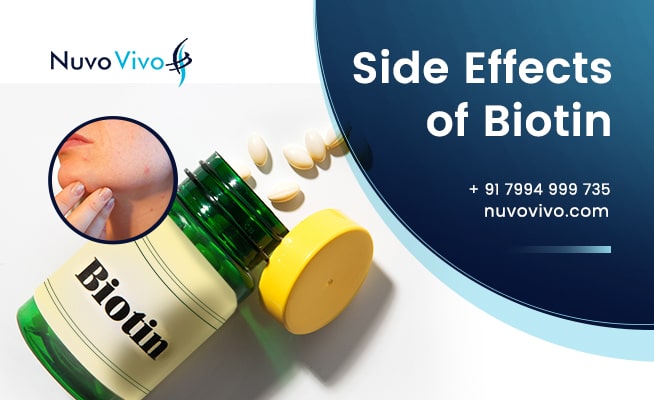Who doesn’t love long, lustrous hair like Rapunzel’s?
Shiny, thick, and healthy hair is a dream for everyone, be it men or women. A bunch of hair strands caught in the comb is always annoying and frustrating.
Even though shedding 50 to 100 strands of hair a day is considered normal, more than that should be an alarming sign of clumpy hair loss. Hair loss is always a daunting nightmare for both men and women.
People struggling with occasional hair loss or severe hair shedding are likely to try anything touted to promote healthy hair growth. Are these products as good as they are glorified, or are these just a hoax to increase sales?
Biotin is a common supplement that is often glamorized as a wonder product to combat hair loss.
Are biotin tablets for hair growth a hoodwink for marketing? Are biotin tablets beneficial for hair? What are the foods rich in biotin for hair growth? How much is the daily recommended biotin tablets dosage? Are there any side effects for biotin tablets?
Let’s find out answers to all of these questions. We dove into research on biotin details and have gathered enough information for you.
Scroll down and keep reading to know more about biotin for hair growth.
ALSO READ: WHY DO SOME PEOPLE LOSE HAIR DURING WEIGHT LOSS?
What is Biotin?
Biotin is one among the B complex group of vitamins (B-Vitamins) found in food, also known as vitamin H or B7, which aids in metabolizing carbohydrates, fats, and proteins. As it converts the food you eat into energy and helps in carrying nutrients throughout the body, it plays a crucial role in our health.
Even though biotin offers many health benefits, it is mostly lauded for its hair and skin benefits. You can keep a healthy biotin level by eating foods high in biotin.
Beans, lentils, peas, egg yolk, liver, almonds, sunflower seeds, mushrooms, sweet potatoes, bananas, avocados, meat, tuna, salmon, broccoli, etc., are some of the biotin-rich foods you can add to your diet.
Biotin is also available in dietary supplements, including B-vitamin complexes, multivitamins, and individual supplements. Moreover, biotin powder for hair is available in the market, which can be either added to foods or smoothies or taken individually.
What is Biotin Used for? Does Biotin Help Hair Growth?

Biotin is typically used for treating people who are suffering from biotin deficiency. Taking biotin doses orally or intravenously can treat and prevent low biotin levels. The overall hair thinning that may progress to hair loss can be one of the major signs of biotin deficiency, which usually appears gradually.
Hair loss due to biotin deficiency can be treated with the intake of biotin supplements. Since the lack of biotin can lead to hair thinning, a lot of people recommend biotin supplements for promoting hair growth even if they are not biotin deficient.
However, to date, there is no scientific evidence to support the claim that biotin has positive effects on hair growth. Even though biotin tablets for hair growth are available without a prescription, it is something you should only take if you are biotin deficient and that too, in the right dosage advised by your healthcare provider.
ALSO READ: DIABETES AND HAIR LOSS
How Much Biotin is Required for Hair Growth; Dosage
These days, ‘biotin’ is a buzzword in the hair care industry, picking up steam as a hair growth-promoting ingredient infused in hair care products. Although it is readily available as a supplement and praised as a wonderworking product, do you think it is good to consume biotin for hair growth without a proper diagnosis?
Moreover, taking the wrong dose might be more harmful than we thought. So, the intake of the right dose as per the prescription by your healthcare provider is necessary to obtain results.
Recommended daily dosage of biotin varies depending on age, nutrient demands, gender, medical condition, etc. As biotin deficiency is a very rare condition, the Food and Drug Administration (FDA) doesn’t provide any guidelines regarding daily recommended dietary allowance (RDA) for biotin.
A high dosage of biotin may interfere with some lab results, showing false positives and false negatives. Always talk with your doctor to find out the right dosage for your specific condition.
According to the experts in the Food and Nutrition Board (FNB), the adequate daily intake (AI) for biotin for people in various age groups are:
- Anyone age 19 years or older: 30 micrograms(mcg)
- Ages 14 to 18 years: 25 mcg
- Ages 9 to 13 years: 20 mcg
- Ages 4 to 8 years: 12 mcg
- Ages 1 to 3 years: 8 mcg
- Infants 7 to 12 months: 6 mcg
- Birth to 6 months: 5 mcg
- Pregnant women: 30 mcg
- Nursing mothers: 35 mcg
Through a well-balanced diet, most people can get an adequate amount of biotin needed for improving healthy hair growth. No need for additional intake of biotin unless the person is biotin deficient. Biotin tablets are not for everyone, so consult your doctor before starting to take them.
ALSO READ: FIBER IN YOUR DIET
Health Benefits of Biotin – Advantages to Consider

Being an essential B vitamin, biotin offers a wide variety of health benefits. Although biotin has several proven benefits, more research is needed to get sufficient scientific evidence to assess certain benefits, including its effectiveness on hair growth, healthy skin, or nails. The possible health benefits of biotin include:
- Based on some research results, biotin supplements are thought to be beneficial for people with diabetes. It may aid in maintaining blood sugar levels.
- Biotin helps in fetal development. Be cautious; a high dose can be threatening to the baby. Therefore, extra supplementation isn’t advised.
- Some studies suggest that biotin supplementation might help in multiple sclerosis (MS) treatment, which is an autoimmune disease.
Side Effects of Biotin – Major Disadvantages

If you take biotin tablets as prescribed by your health practitioner, there won’t be any negative ramifications. But, taking large doses of vitamins for faster results has become a newer trend nowadays.
Unfortunately, instead of health benefits, the excessive intake of biotin supplements can harm your body. The possible side effects of biotin include:
- Skin rashes
- Digestive problems
- Skewed lab results
- Allergic reactions
- Problems with insulin release
- Weaken immunity
- Kidney problems
It is not a miraculous pill that resolves all of your hair problems, so don’t try to overdose on it in the greed of expeditious results. Talk with your doctor and only consume the recommended dietary level to avoid the negative side effects.
Biotin supplementation can interfere with thyroid function tests. So if you are hypothyroid and are planning to perform a Thyroid test to check thyroid function, you need to stop the Biotin supplementation for at least 2-3 days before the test day.
Biotin supplementation does not interfere with the thyroid medication; it only interferes with the thyroid test (bioassays).
ALSO READ: WHAT IS GLUTEN?
Biotin Deficiency
Biotin deficiency is a rare nutritional disorder. People who follow a healthy, balanced diet are rarely affected by biotin deficiency. Due to the presence of avidin in egg whites, which is a glycoprotein that exhibits strong biotin binding characteristics, prolonged consumption of raw eggs can be a major cause of biotin deficiency.
Biotinidase deficiency (BTD), an inherited metabolic disorder in which the body is unable to process biotin, can lead to biotin deficiency. Red rashes on the skin, hair thinning, brittle nails, dry or scaly skin, fatigue, insomnia are some of the signs and symptoms that may develop due to biotin deficiency.
ALSO READ: WHAT IS YOUR THYRONORM TABLET!?
Summary
Biotin supplements are often touted as a miracle drug to put an end to hair fall and promote thicker and healthier hair growth. Even though it remains a popular, magical supplementation for hair growth, there is no conclusive scientific evidence to vouch for the use of biotin supplements to promote hair growth unless a person is truly biotin-deficient.
A balanced diet, quality sleep, and exercise are what we recommend for soft and supple hair. Don’t fall into the pit of advertising tactics in hair commercials.
Frequently Asked Questions
Yes, biotin supplements may cause some negative side effects if you take them too much.
There is no convincing scientific evidence to support the effectiveness of biotin in promoting hair growth unless the person is biotin deficient.
Biotin deficiency can cause symptoms like red rashes on the skin, hair thinning, brittle nails, dry or scaly skin, fatigue, insomnia, etc.

